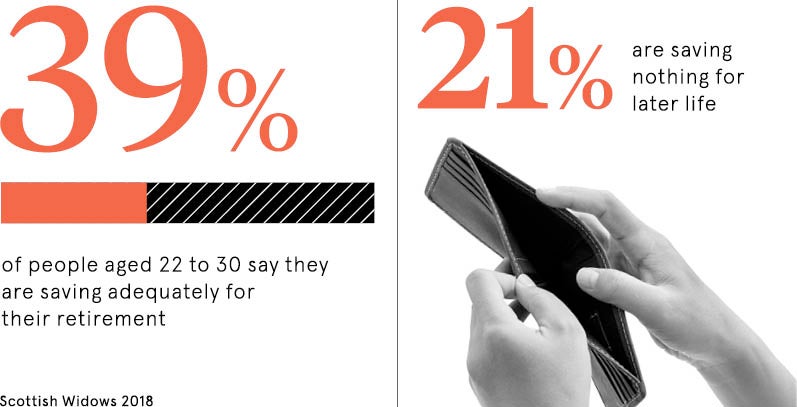The terror-stricken diary of a millennial is now a permanent feature of newspapers, along with the football scores and obituaries. A recent Guardian column by the eloquent journalist Juliana Piskorz was a classic of the genre.
“I am 25 and a half, single, unable to pay my rent and the closest thing I own to a car is a broken skateboard,” wrote Ms Piskorz. “It seems too old to still be living at home, for your card to be declined buying loo roll.” Just thinking about her situation triggered waves of adrenaline. “My head began to spin, a familiar tightness seized my chest and the sweat glands in my palms went into overdrive, signalling the beginning of a panic attack that would last the best part of the day.”
It’s no way to live. Mr Piskorz found a crumb of solace by talking to a psychiatrist, who helped her make sense of societal changes and how she saw her place in it. The themes are perennial: the replacement of a job for life with job hopping; the decline of entire industries including journalism; and the malevolent impact of social media, comparison being the thief of joy.
Financial wellness could be secret to productive employees
But another source of advice might help too. A corporate financial wellness service. This isn’t facetious. Company advisers are now on the front line of helping employees make sense of a chaotic financial world. Even low-wage workers may find their employer takes an active role in helping them handle their finances.
“Companies know that there is a clear link between employee contentment and productivity,” says Damian Stancombe, head of workplace health and wealth practice at Barnett Waddingham, a corporate pensions and investment consultancy. “So the trend is for companies to think about the wider financial wellness of staff. They are bound by law to auto-enrol staff into a pension, but the best are expanding beyond that. For example, by providing a debt consolidation service.
“About a quarter of employees are struggling with what they see as problem debt, so a company-supplied consolidation service can be of real value. Payments can be made from payroll at advantageous rates, so it’s a real benefit for staff.”
A company can encourage staff to think about how they save. Employees often wonder whether to save in a pension or an ISA. A company is in a great place to provide information to employees, who otherwise have little appetite to organise their finances.

Online services are the first step to greater financial wellness
The fact that employees need more information about their finances is clear. A survey by YouGov shows around half of people in the UK are totally or partially unsure whether they are putting enough into their pension. Only 6 per cent are “definitely” sure they are saving enough. Meanwhile, half of millennials with a workplace pension struggle to understand their scheme, according to Prudential. Corporate financial wellness is a concept designed to improve both awareness and the action taken by employees to improve these numbers.
Online services are a growing part of the wellness equation. A human consultation can be prohibitively expensive, but online “robo-advisers” are a game-changer, making it possible for everyone, no matter what hours they work, to access decent advice. Employees answer questions via a web browser to see whether their contribution levels are on track and how a change would affect income when they retire. The method is ideal for anyone too time-poor or nervous to visit a human pension adviser or simply who enjoys a quick pension review every so often.
The service is usually free to employees; the bill is paid by companies who want their staff to feel confident about their money.
Companies are thinking creatively about how to help employees save money. Barnett Waddingham, for example, offers staff access to an online discount shopping service supplied by Sodexo. Around 5 per cent can be saved on supermarkets, restaurants and high street chains. Around 70 per cent of Fortune 1000 companies offer staff an online discount portal.
The rules of retirement are shifting
Also, companies can even help staff reflect on the concept of retirement. The old rules said you retire at 65. But in the past five years there’s been radical rethink. Former pensions minister Ros Altmann is leading the campaign to decouple the pension age from the retirement age. In a nutshell, you can, if you desire, keep working after the date when your pension kicks in. Either enjoy the extra income or defer the cash and swell your pension pot.
The incentive for companies to offer advice to employees on their retirement age is clear. The National Institute of Economic and Social Research suggests that if people worked an extra three years, it would add up to 3.25 per cent in real GDP every year. Not only is the workforce larger, but younger employees benefit from the mentoring and productivity of their older colleagues. That “per year” claim needs highlighting. It’s enough to catapult the UK into tiger economy status, radically improving job opportunities and salaries for younger workers.
Above all, corporate financial wellness services are blossoming because companies understand that happy employees will be more hard working. Both parties gain. Worried employees get advice, plus helpful services to improve their financial life. And companies get calmer, appreciative workers.
It’s early days for the concept of corporate financial wellness – even the name is a bit clumsy – but the demand and logic for it are undeniable.
Financial wellness could be secret to productive employees

